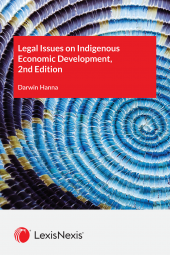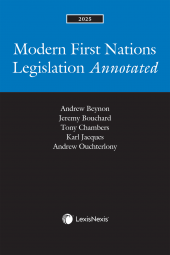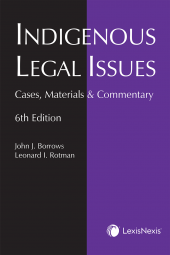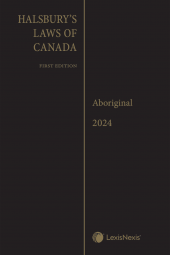Legal Issues on Indigenous Economic Development, 2nd Edition
This book explores the legal framework concerning economic development opportunities for Indigenous communities and nations.
One Year Subscription Only Terms
Subscribers receive the product(s) listed on the Order Form and any Updates made available during the annual subscription period. Shipping and handling fees are not included in the annual price.
Subscribers are advised of the number of Updates that were made to the particular publication the prior year. The number of Updates may vary due to developments in the law and other publishing issues, but subscribers may use this as a rough estimate of future shipments. Subscribers may call Customer Support at 800-833-9844 for additional information.
Subscribers may cancel this subscription by: calling Customer Support at 800-833-9844; emailing customer.support@lexisnexis.com; or returning the invoice marked 'CANCEL'.
If subscribers cancel within 30 days after the product is ordered or received and return the product at their expense, then they will receive a full credit of the price for the annual subscription.
If subscribers cancel between 31 and 60 days after the invoice date and return the product at their expense, then they will receive a 5/6th credit of the price for the annual subscription. No credit will be given for cancellations more than 60 days after the invoice date. To receive any credit, subscriber must return all product(s) shipped during the year at their expense within the applicable cancellation period listed above.
Product description
Indigenous communities in Canada are actively involved in economic development opportunities based upon their unique circumstances. Indigenous communities advance economic development opportunities to self-determine their economic strategy and priorities and to implement community economic plans. This book provides a practical grounding in the various legal considerations and developmental issues that arise when Indigenous Nations engage in economic development initiatives. Through the implementation of UNDRIP (United Nations Declaration on the Rights of Indigenous Peoples) and accommodation of aboriginal and Treaty rights, Indigenous communities have been able to leverage impact and benefit negotiations to further their economic development, often through unique corporate structures.
Legal Issues on Indigenous Economic Development, 2nd Edition explores the legal framework concerning economic development opportunities for Indigenous communities and nations. Author Darwin Hanna brings over 25 years of experience, practicing and teaching in indigenous economic development. In this book, he thoroughly reviews the implementation of the principle of free, prior and informed consent and provides economic development case studies of communities, including in respect to gaming and cannabis opportunities. He shares his unique insight into the principles governing Aboriginal and business law, providing readers with a deeper understanding of the key decisions, concepts and doctrines in this changing and evolving area.
What's New In This Edition
- New and expanded discussion of economic opportunities for Indigenous people relating to cannabis, gaming and renewable energy projects
- Additional accommodation agreements for revenue sharing, business opportunity and major business developments involving Indigenous people
- Review of UNDRIP’s principle recognizing that Indigenous people have the right to give free, prior, and informed consent to legislation and development affecting their lands, natural resources, and other interests, and to receive remedies for losses of property taken without such consent
- New duty of accommodation caselaw resulting in additional economic opportunities for Indigenous people
Who Should Read This Book
- Indigenous Nations, boutique Aboriginal law firms and Indigenous law practice groups that regularly deal with Indigenous rights, business and natural resources matters
- Practitioners and in-house counsel who advise Aboriginal businesses and clients dealing with Aboriginal claims or issues
- Governments, Indigenous governments and organizations who require up to date information about Aboriginal economic interests relevant to land, resources and treaty rights
- Libraries who want to provide a resource for lawyers and students who don't regularly deal with Aboriginal law matters
- Law students who are interested in learning about all aspects of Aboriginal law
Table of contents
CHAPTER 1: INTRODUCTION
CHAPTER 2: ACCOMMODATION OF INDIGENOUS ECONOMIC FISHERY INTERESTS
CHAPTER 3: ABORIGINAL TITLE
CHAPTER 4: TREATIES AND DUTY OF ACCOMMODATION
CHAPTER 5: ECONOMIC DEVELOPMENT CASE STUDIES
CHAPTER 6: CORPORATE STRUCTURING FOR INDIGENOUS NATIONS
CHAPTER 7: IMPACT BENEFIT AGREEMENT CONSIDERATIONS
CHAPTER 8: FINANCING
CHAPTER 9: EQUITABLE COMPENSATION
CHAPTER 10: RESERVE LAND DEVELOPMENT
CHAPTER 11: TAXATION CONSIDERATIONS
CHAPTER 12: IMPLEMENTATION OF THE FREE, PRIOR AND INFORMED CONSENT STANDARD
CHAPTER 13: INDIGENOUS VALUES AND SUSTAINABLE DEVELOPMENT
INDEX
 Lexis Nexis
Lexis Nexis 



